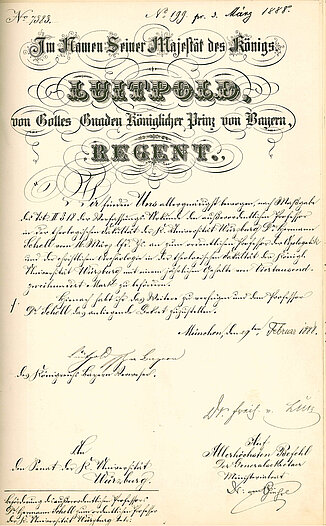Herman Schell
* 28. February 1850 in Freiburg im Breisgau † 31. June 1906 in Würzburg
1868 Entry into a theological residence in Freiburg
Study of Philosophy and catholic Theology in Freiburg
1870 Dismissal from theological residence
Transition to the Julius-Maximilians-Universität Würzburg
Assistant of Franz Brentano
1872 Conferral of a doctorate in Freiburg (Philosophy)
1873 Ordination to the priesthood
1879 Continuation of theological studies in Rome
1881 Return to Würzburg
1883 Conferral of a doctorate in Tübingen (Theology)
1884 Professorship at the Julius-Maximilians-Universität Würzburg
The Universitätsarchiv Würzburg is pleased to honor the philosopher and theologian Herman Schell as its Scholar of the month for March 2018. His brave theses, as well as his commitment for the reformation of the church made him a target for the resentment of his colleagues and of the Vatican. Even if he couldn’t witness it anymore, his ambitions did anticipate the upcoming development of the church in the 20th century.
A life dedicated to the church
Since leaving the Freiburger Lyzeum, Herman Schell orientated his life towards an theological education – which can also be seen through his choices of students’ fraternities he was committed to: Apart from the KStV Walhalla Würzburg (Catholic students’ fraternity), he was also honorary member of several other fraternities and operated actively in the “Kartellverband Katholischer Deutscher Studentenvereine”. Even if he was later known as a dogmatist, he could gain practical experiences in his pastoral duties after his ordination to the priesthood as a religious education teacher and spiritual guide.
Modern dogmatic
His creations reveal an intense orientation of Schell towards a contemporary dogmatic and the reformation of the church in general. He deliberately placed himself against the conservative Neo-scholasticism of his time, as he opposed their relatively static concept of God with his causa sui, which theoretically combines the Trinitarian Reality of God with the theistic concept of God. Furthermore he advocated the improvement of the education for Catholics, more tolerance of the church concerning research and science and the usage of the German language for liturgy and theological education. Additionally he also established himself as a representative of the Reform-Catholicism at the sharp end, by publishing two pamphlets about Americanism.
Loyal lateral thinker
During his lifetime, Schell didn’t always come across endorsement. Especially his more progressive writings were the cause for some trouble. He was dismissed from the theological residence in Freiburg out of disciplinary reasons. He also had to submit his theological doctoral thesis in Tübingen, in order to avoid trouble with the professional representatives in Würzburg and Freiburg and he couldn’t achieve his professorship in Würzburg without facing the resistance of his colleagues and his precursor. Moreover did two of his publications end up on the Roman index. But it was not his aim to be willingly provocative – for example did he accept the indexing of his workings without contradiction, as a profession of faith to the church – but it is rightfully to claim that Herman Schell’s way of thinking was ahead of his time: With the second Vatican Council (1963-65), the Vatican verified many of his statements (even the indexed one’s) and newly revived the remembrance of Schell.





